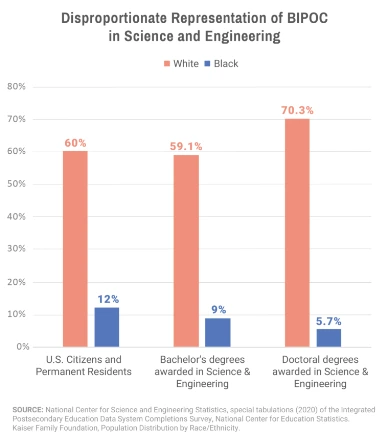First thing first. STEM is an acronym for Science, Technology, Engineering, and Maths. The fascinating history of STEM’s inception dates back to 2001, when biologist Judith Ramaley, an assistant director of education and human resources at the American National Science Foundation (NSF), was instrumental in its formation. She created the STEM acronym by rearranging the letters SMET. Later, STEM-focused curricula became popular in the United States and later countries like Australia, China, France, South Korea, Taiwan, and the United Kingdom started to adopt it.
STEM advancement in the United States
Everybody views the US as a fertile land for technical innovation. Well, why not? The products of America are Mark Zuckerberg, Steve Jobs, Bill Gates, and many more. You might be surprised to hear, however, that US kids were not making the same progress in STEM subjects as students in other nations as early as 2000.
The 2005 report Rising Above the Gathering Storm, which was released by the U.S. National Academies of Science, Engineering, and Medicine highlighted the links between wealth, knowledge-intensive jobs dependent on research and technology, and continued innovation to address societal problems. The report also underlined the performance of the US students and the consequences if the country could not compete in the global economy as the result of a poorly prepared workforce.
The report was like a wake-up alarm, and instantly attention shifted to science, mathematics, and technology research, economic policy, and education. The experts realized that these areas play a critical role in maintaining prosperity in the country.
Afterward, results from international studies like PISA and TIMSS confirmed American concerns. Surprisingly, the United States had a very high percentage of underperforming students, so much so that the US was ranked 21st out of 30 nations in tests of scientific knowledge and proficiency.
This led to the formation of a bipartisan congressional STEM Education Caucus. It underlined the following:
“Our knowledge-based economy is driven by constant innovation. The foundation of innovation lies in a dynamic, motivated, and well-educated workforce equipped with STEM skills.”
So, now we know how STEM came into being and why. Next, we will explore the diversity in STEM.
What is diversity in STEM?
The concept of diversity encompasses a wide spectrum. It means the inclusion and engagement of individuals from various social strata, ethnic backgrounds, genders, and more. When we fuse diversity with STEM, it broadens its scope even further.
Diversity in STEM refers to the inclusion and representation of individuals from various backgrounds, including those of different genders, races, ethnicities, socioeconomic statuses, sexual orientations, abilities, and cultural perspectives, within the fields of Science, Technology, Engineering, and Mathematics.
It emphasizes the importance of creating an inclusive environment where people from all walks of life have equal opportunities to participate, contribute, and excel in STEM-related disciplines. This inclusivity is essential for driving innovation, addressing complex challenges, and ensuring that advancements in STEM benefit a wide range of communities and perspectives.
BIPOC: Black, Indigenous, and people of color.
Image Source: https://lifeology.io/
Why is diversity in STEM necessary?
1. The key to long-term economic growth and global competitiveness is fostering diversity
Fostering diversity in STEM fields is paramount for long-term economic growth and global competitiveness. A diverse workforce brings a broader range of perspectives, innovative ideas, and problem-solving approaches to the table. This diversity fuels creativity and accelerates technological advancements, ensuring that solutions cater to a wider demographic.
Moreover, diverse teams are more adaptable and better equipped to navigate the complexities of an ever-changing global landscape. By embracing inclusivity in STEM, we not only unlock the full potential of human ingenuity but also fortify our position in the competitive global arena.
2. Enhancing Problem-Solving Abilities
Enhancing problem-solving abilities in STEM (Science, Technology, Engineering, and Mathematics) is a direct result of diverse perspectives and approaches. When individuals from different backgrounds and experiences collaborate, they bring unique insights to complex challenges.
3. Fostering Inclusive Technology
Without diversity, there’s a risk of creating technology that inadvertently excludes certain demographics. A diverse workforce is more likely to identify and rectify biases, resulting in technology that is accessible and beneficial to all.
4. Breaking Down Barriers
Historically, certain demographics have faced barriers in accessing STEM education and careers. Promoting diversity actively dismantles these barriers, creating equal opportunities for all, regardless of background or identity.
5. Nurturing a Culture of Respect and Understanding
Diversity promotes a culture of respect, empathy, and understanding. When individuals from different backgrounds work together, it fosters an environment where everyone’s voice is heard and valued.
6. Addressing Ethical Concerns
Technology is not neutral; it’s influenced by the values and perspectives of its creators. A lack of diversity can lead to the development of technologies that inadvertently perpetuate biases or ethical concerns. A diverse team is more likely to identify and address these issues.
7. Enhancing Problem-Solving Abilities
Teams with a variety of members are often better at solving problems. Different perspectives bring a wider range of possible solutions, leading to more comprehensive and robust problem-solving strategies.
8. Encouraging Representation for All
Seeing individuals from underrepresented groups excelling in STEM fields inspires future generations. It breaks down stereotypes and encourages young minds to pursue their passions, knowing that they too can make a significant impact.
9. Reflecting on the Real World
Our planet is a patchwork of many cultures, tongues, and customs. A diverse STEM workforce mirrors this reality, ensuring that technologies and solutions are developed with a global perspective, addressing the needs of a wide range of communities
10. Meeting the Demands of a Changing World
As our world grapples with increasingly complex challenges, from climate change to public health crises, diverse perspectives are essential. Different backgrounds bring unique insights and approaches that are vital in finding holistic, sustainable solutions.
Conclusion
In conclusion, diversity in STEM isn’t just a buzzword; it’s a fundamental necessity for progress and innovation in our rapidly advancing world. Embracing diversity in STEM fields ensures that our technologies and solutions are inclusive, ethical, and capable of addressing the complex challenges of our time. It’s not only a matter of equality but a strategic imperative for a brighter and more inclusive future. So let’s work together to foster diversity in STEM and unleash the full potential of human ingenuity.
Moonpreneur is on a mission to disrupt traditional education and future-proof the next generation with holistic learning solutions. Its Innovator Program is building tomorrow’s workforce by training students in AI/ML, Robotics, Coding, IoT, and Apps, enabling entrepreneurship through experiential learning.


















